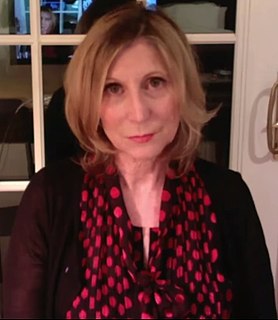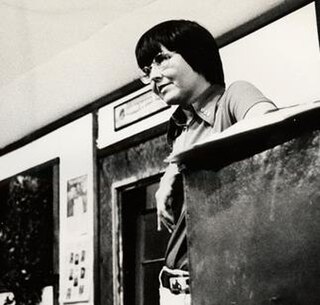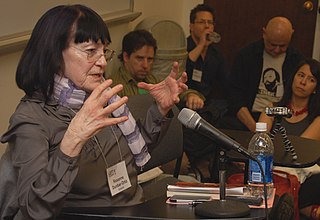
Donna J. Haraway is an American Professor Emerita in the History of Consciousness Department and Feminist Studies Department at the University of California, Santa Cruz, United States. She is a prominent scholar in the field of science and technology studies, described in the early 1990s as a "feminist and postmodernist". Haraway is the author of numerous foundational books and essays that bring together questions of science and feminism, such as "A Cyborg Manifesto: Science, Technology, and Socialist-Feminism in the Late Twentieth Century" (1985) and "Situated Knowledges: The Science Question in Feminism and the Privilege of Partial Perspective" (1988). Additionally, for her contributions to the intersection of information technology and feminist theory, Haraway is widely cited in works related to Human-Computer Interaction (HCI). Her Situated Knowledges and Cyborg Manifesto publications in particular, have sparked discussion within the HCI community regarding framing the positionality from which research and systems are designed. She is also a leading scholar in contemporary ecofeminism, associated with post-humanism and new materialism movements. Her work criticizes anthropocentrism, emphasizes the self-organizing powers of nonhuman processes, and explores dissonant relations between those processes and cultural practices, rethinking sources of ethics. Haraway criticizes the Anthropocene because it generalizes us as a species. However, she also recognizes the importance of it recognizing humans as key agents. Haraway prefers the term Capitalocene which defines capitalism's relentless imperatives to expand itself and grow, but she does not like the theme of irreversible destruction in both the Anthropocene and Capitalocene.

Christina Marie Hoff Sommers is an American author and philosopher. Specializing in ethics, she is a resident scholar at the American Enterprise Institute. Sommers is known for her critique of contemporary feminism. Her work includes the books Who Stole Feminism? (1994) and The War Against Boys (2000). She also hosts a video blog called The Factual Feminist.
Women's studies is an academic field that draws on feminist and interdisciplinary methods in order to place women's lives and experiences at the center of study, while examining social and cultural constructs of gender; systems of privilege and oppression; and the relationships between power and gender as they intersect with other identities and social locations such as race, sexual orientation, socio-economic class, and disability.

Mary Daly was an American radical feminist philosopher, academic, and theologian. Daly, who described herself as a "radical lesbian feminist", taught at the Jesuit-run Boston College for 33 years. Daly retired in 1999, after violating university policy by refusing to allow male students in her advanced women's studies classes. She allowed male students in her introductory class and privately tutored those who wanted to take advanced classes.
Radical Women (RW) is a socialist feminist grassroots activist organization. It has branches in Seattle, Washington, and Melbourne, Australia.
Feminist theory is the extension of feminism into theoretical, fictional, or philosophical discourse. It aims to understand the nature of gender inequality. It examines women's and men's social roles, experiences, interests, chores, and feminist politics in a variety of fields, such as anthropology and sociology, communication, media studies, psychoanalysis, ecology, home economics, literature, education, and philosophy.

Marxist feminism is a philosophical variant of feminism that incorporates and extends Marxist theory. Marxist feminism analyzes the ways in which women are exploited through capitalism and the individual ownership of private property. According to Marxist feminists, women's liberation can only be achieved by dismantling the capitalist systems in which they contend much of women's labor is uncompensated. Marxist feminists extend traditional Marxist analysis by applying it to unpaid domestic labor and sex relations.
Socialist feminism rose in the 1960s and 1970s as an offshoot of the feminist movement and New Left that focuses upon the interconnectivity of the patriarchy and capitalism. However, the ways in which women's private, domestic, and public roles in society has been conceptualized, or thought about, can be traced back to Mary Wollstonecraft's A Vindication of the Rights of Woman (1792) and William Thompson's utopian socialist work in the 1800s. Ideas about overcoming the patriarchy by coming together in female groups to talk about personal problems stem from Carol Hanisch. This was done in an essay in 1969 which latter coined the term 'the personal is political.' This was also the time that second wave feminism started to surface which is really when socialist feminism kicked off. Socialist feminists argue that liberation can only be achieved by working to end both the economic and cultural sources of women's oppression. Socialist feminism is a two-pronged theory that broadens Marxist feminism's argument for the role of capitalism in the oppression of women and radical feminism's theory of the role of gender and the patriarchy. Socialist feminists reject radical feminism's main claim that patriarchy is the only, or primary, source of oppression of women. Rather, Socialist feminists assert that women are oppressed due to their financial dependence on males. Women are subjects to male domination within capitalism due to an uneven balance in wealth. They see economic dependence as the driving force of women's subjugation to men. Further, Socialist feminists see women's liberation as a necessary part of larger quest for social, economic, and political justice. Socialist feminists attempted to integrate the fight for women's liberation with the struggle against other oppressive systems based on race, class, sexual orientation, or economic status.

Roxanne Dunbar-Ortiz is an American historian, writer, and activist, known for 2019 work An Indigenous Peoples' History of the United States.
Carol Rowell Council is the co-founder of the women's studies department at San Diego State University, the first women’s studies program in the United States, in 1969. The other co-founder is Dr. Joyce Nower. Today, there are over 600 women's studies programs around the world.
Tani Barlow is a scholar of feminism, postcoloniality, and history in Asia and most specifically in China. She is the George and Nancy Rupp Professor of Humanities at Rice University. Formerly, Barlow was a professor of history and women studies at the University of Washington. She is known for her research on Chinese feminism.
Marilyn Frye is an American philosopher and radical feminist theorist. She is known for her theories on sexism, racism, oppression, and sexuality. Her writings offer discussions of feminist topics, such as: white supremacy, male privilege, and gay and lesbian marginalization. Although she approaches the issues from the perspective of justice, she is also engaged with the metaphysics, epistemology, and moral psychology of social categories.
Nellie Wong is a poet and activist for feminist and socialist causes. Wong is also an active member of the Freedom Socialist Party and Radical Women.

Sally Miller Gearhart was an American teacher, feminist, science-fiction writer, and political activist. In 1973, she became the first open lesbian to obtain a tenure-track faculty position when she was hired by San Francisco State University, where she helped establish one of the first women and gender study programs in the country. She later became a nationally known gay rights activist.
Lucia Chiavola Birnbaum is a Sicilian-American feminist cultural historian and professor emerita.
Feminist political theory is an area of philosophy that focuses on understanding and critiquing the way political philosophy is usually construed and on articulating how political theory might be reconstructed in a way that advances feminist concerns. Feminist political theory combines aspects of both feminist theory and political theory in order to take a feminist approach to traditional questions within political philosophy.
Ann Garry is a professor of philosophy, emerita, at California State University, Los Angeles (CSULA). While at CSULA, Garry was the founding director of the Center for the Study of Genders and Sexualities, and also served several terms as the chair of the Department of Philosophy. She has also held several visiting appointments, including serving as the Humphrey Chair of Feminist Philosophy at the University of Waterloo and Fulbright lectureships at the University of Tokyo and Eötvös Loránd University in Budapest. Although Garry no longer teaches full-time, she continues to work with graduate students.
The Groupe Feministe Socialiste was founded in 1899 by Louise Saumoneau and Elisabeth Renaud, both working class socialists who wished to bring feminism to the working class in France. The socialist movement and the feminist movement both existed, but had little overlap prior to this point.
Catharine R. Stimpson is a feminist scholar, University Professor, professor of English, and dean emerita of the Graduate School of Arts and Science at New York University.
Dorinda Moreno is an American Chicana activist, feminist and writer.





